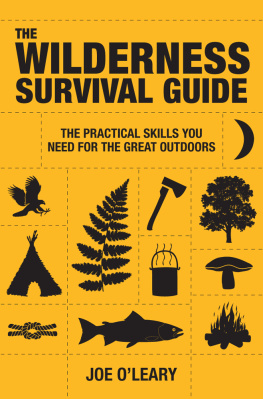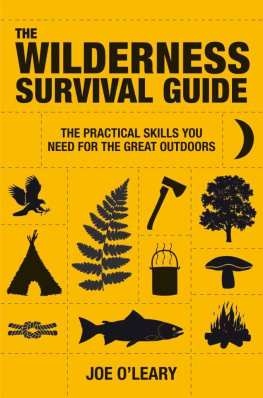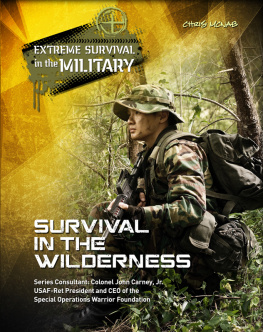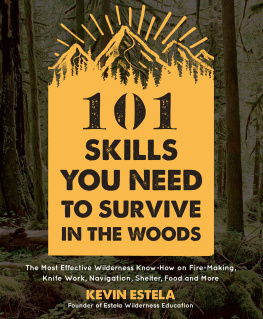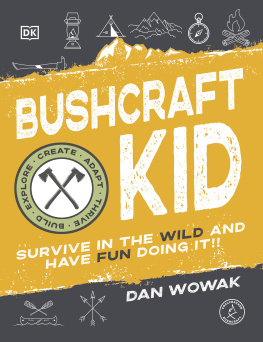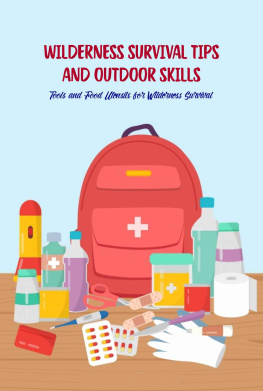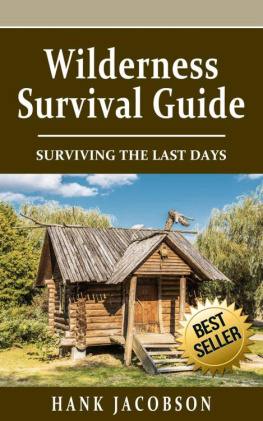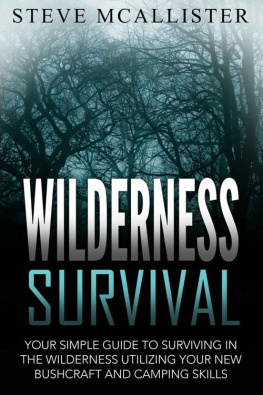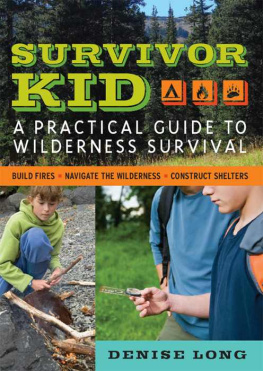Joe OLeary has had a passion for spending time in wild places since he was a child. Eight years of military service developed these early experiences into useful skills, and after leaving the army Joe carried on learning the art of survival from some of the best bushcraft instructors in the UK. He runs his own company, Wilderness Survival Skills, which teaches bushcraft from basic to advanced level.
Print edition first published in the UK and USA 2010 by
Watkins Publishing, Sixth Floor, Castle House,
7576 Wells Street, London W1T 3QH
Text Copyright Joe OLeary 2010
Joe OLeary has asserted his right under the Copyright, Designs
and Patents Act 1988 to be identified as the author of this work.
All rights reserved.
No part of this book may be reproduced or utilized in any form
or by any means, electronic or mechanical, without prior permission in writing from the Publishers.
Designed by Jerry Goldie
Printed and bound Imago in China
British Library Cataloguing-in-Publication Data Available
Library of Congress Cataloging-in-Publication Data Available
ISBN: 978-1-78028-235-0
www.watkinspublishing.co.uk
THE
WILDERNESS SURVIVAL GUIDE
Joe Oleary
Contents
ACKNOWLEDGEMENTS
I would like to thank all the teachers, trainers and instructors who have kindly passed on their knowledge and expertise to me over the years and served as an inspiration in all manner of ways. Especially my Nan, who was always a Girl Guide at heart. She bought me my first proper survival book. I would have loved to have given her this one in return.
Also, my family, friends and fellow instructors, who kept me on the straight and narrow while writing this book with their valued feedback and honest opinions.
I would like to thank Kev Palmer, a highly experienced bushcraft instructor and man of the woods himself, for scribbling away day and night to provide the illustrations.
In particular I must thank my wife, Clare, who has propped me up with regular strong coffee, chocolate biscuits on tap and amazing magic meals that appear from nowhere.
Lastly, to my most recent source of inspiration and motivation my soon-to-be appearing son, who still has no name: I hope you enjoy the woods as much as I do, but if you dont ... well, thats ok. Well play football instead.
INTRODUCTION
T his book provides a guide to surviving in the wilderness. But how is a wilderness defined? It is often identified as a vast and barren area, a wasteland. It is also thought of as a wild, untamed, endlessly harsh and dangerous environment. Neither version sounds like an ideal holiday destination that any sane person would want to spend their time in! It is, however, an undeniable fact that some of us regularly seek out the extreme and testing conditions that the wilderness provides. We are tempted away from a comfortable life, where we have pretty much everything we need, to spend our spare time in wild places often the wilder the better! If we cant manage to get there physically, we spend our time dreaming about being there, planning trips and immersing ourselves in stories of other peoples daring adventures in the great outdoors. We hear exciting tales of overcoming adversity and hardship, resilience, ingenious improvisation, mental and spiritual fortitude, which are all admirable qualities in our fellow humans. Inspired by these tales, people go there to prove themselves, develop their strengths and expose any weaknesses. But we also hear stories about the beauty, the peace and the quiet, the unhurried pace and the freedom the wilderness allows, and so others visit for solitude, isolation, somewhere they can clear a fuzzy head and recharge their batteries.
A wilderness means different things to different people and they seek it out for many varied reasons. For myself, spending time in wild places, wherever they might feature on the wilderness scale, provides a much-needed reality check, bringing me right back down to earth. The rules of nature seem to be clear and simple, the limits easier to define. I can see the immediate effects of my actions and I know that my decisions alone are all important to my comfort and continued existence. It gives me total control over my life again. Unimportant issues are filtered out, leaving only those elements that really matter.
The basic skills required to survive in the wilderness are easily attainable and allow plenty of room for self-discovery. They also seem to make more sense in our lives, to be a more natural use of our time. Surprisingly, some of the more ancient skills feel completely normal, almost like a distant memory that has been reawakened. Theyre easier to decipher than many aspects of modern life, being written in a language ingrained deep within us that we understand. Learning these skills helps us to reassess what is truly important. When theres nobody pumping light, heat and water into your home in exchange for tokens, you must take care of these basic needs yourself. These skills are not only empowering, they also allow us to redress the balance and think more about the consequences of our actions. The knowledge we gain helps us to become familiar once more with the wild resources surrounding us. They gradually form an integral part of our lives, and so are appreciated and treated with respect, ensuring their own survival. We understand our position in the bigger picture and a little more about what makes us who we are today.
This book provides a guide to some of the most vital skills required to survive in the wilderness, but its important to realize that the aim is not to fight against it, more to survive alongside it. This is a more sustainable solution in most cases. The information detailed in this book has helped me immensely in my everyday life as well as enhancing my enjoyment of the great outdoors, and I have not included any technique that I do not regularly use or have not tried myself at some point or another. Many of the skills detailed have proved useful in a variety of different environments and situations. This is not, however, an encyclopedic reference of potential disaster scenarios to treat as an instruction booklet when things start to go wrong. The information provided is intended to help you develop a solid universal foundation of realistic and achievable skills that are transferable to almost any environment.
With regards to your own personal safety, the skills discussed here are best learned at your own pace and in your own good time, so that you can really master and understand them. Dont wait until they become essential to your immediate survival to explore them for the first time get out there and practise! However, any long journey starts with a single step, and if you arent already familiar with spending time away from civilization and emergency help, be aware that most life-threatening situations can be avoided entirely by having some basic navigational and first-aid training. This is something that I am assuming everyone venturing into the great outdoors will have. These subjects are, primarily, best learned first-hand rather than entirely from a book and will ensure that you can safely enjoy forging a firm and lifelong relationship with your version of the wilderness.
CHAPTER 1
BEING PREPARED
The survival kit in your head and the one on your back
O ne aim of this book is to encourage a realistic attitude to survival and the ability and confidence to cope with certain situations. As the Boy Scouts motto states, we should always be prepared. This statement can be interpreted in different ways. Some people assume that this means we should be physically prepared and carry a small survival kit at all times containing a selection of useful items designed to aid the survivor in any situation, anywhere in the world. As long as youre likely to have this mini kit when you need it, this is better than doing nothing at all and will certainly offer an advantage with regards to equipment.

